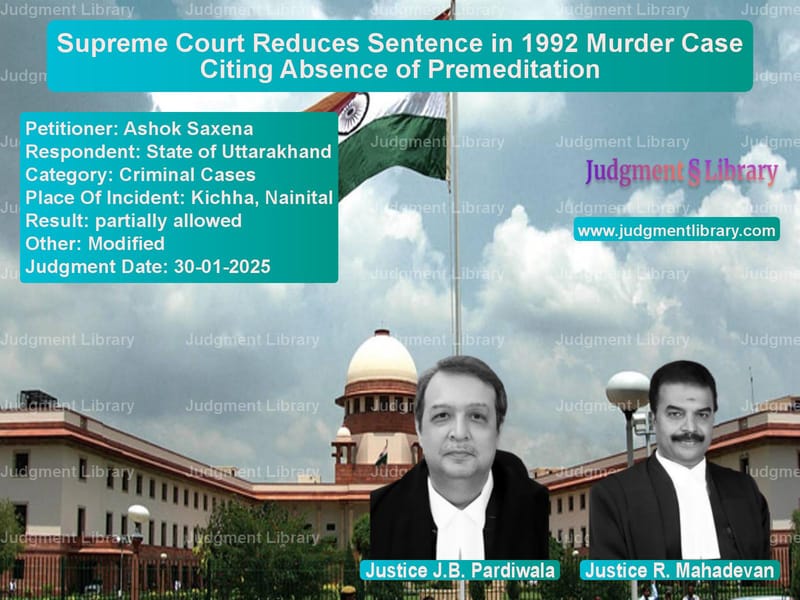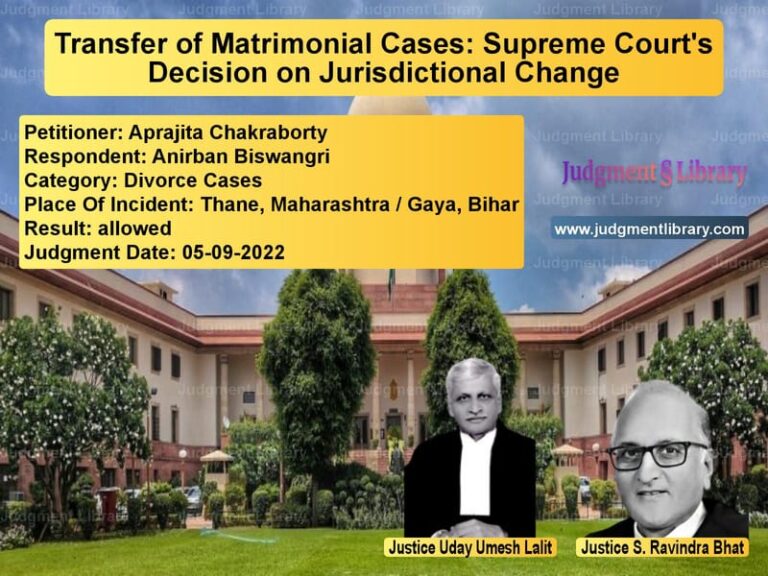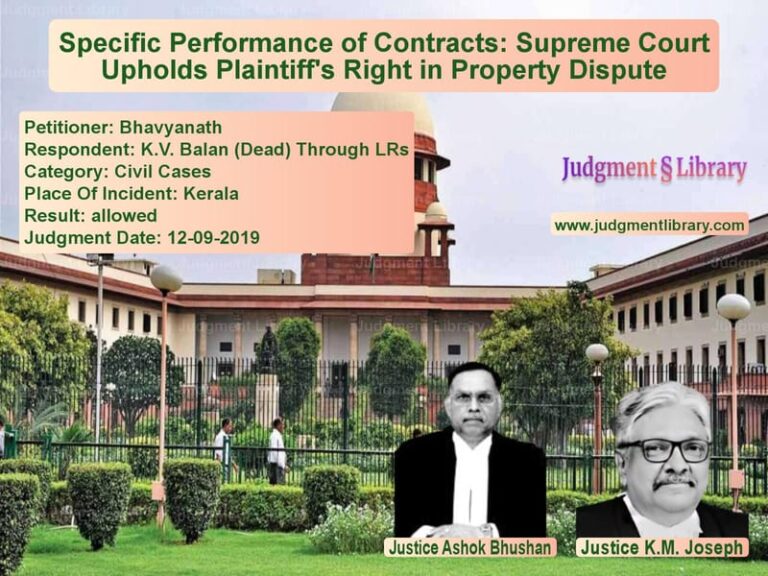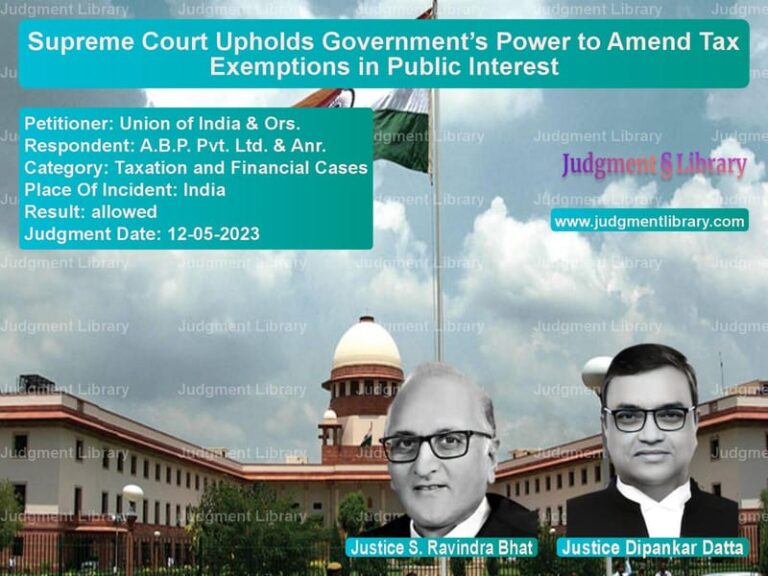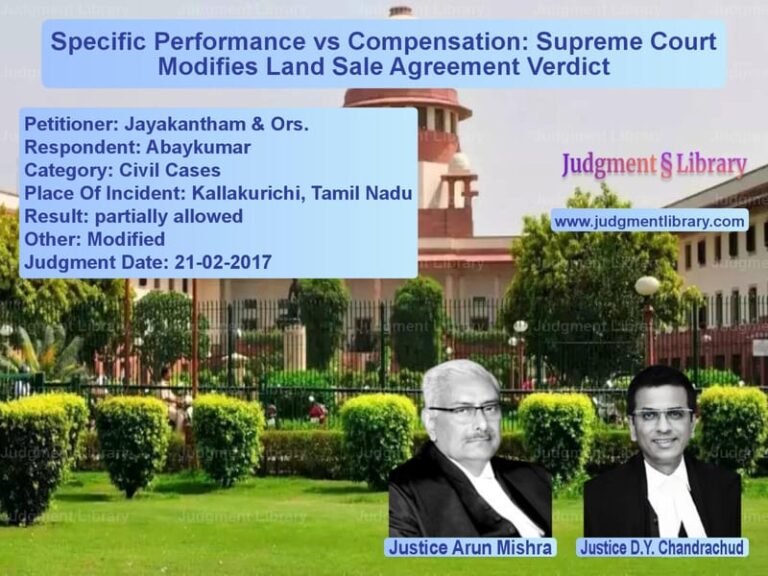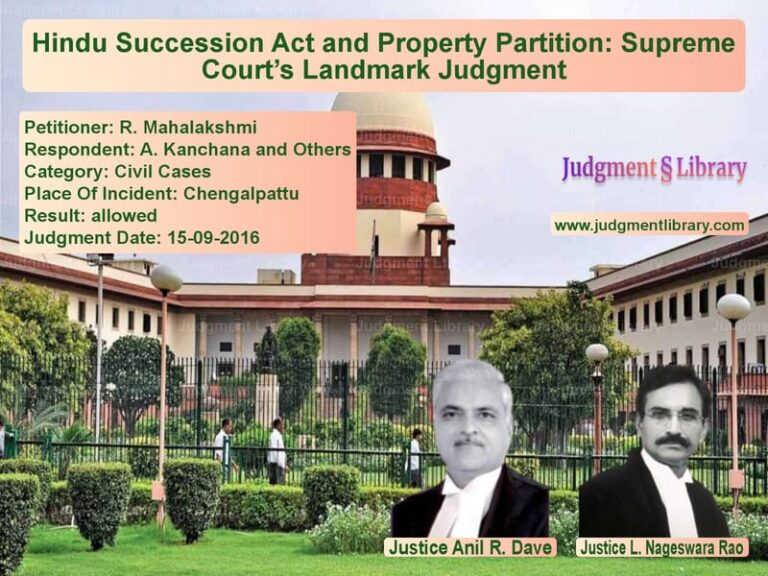Supreme Court Reduces Sentence in 1992 Murder Case Citing Absence of Premeditation
The Supreme Court of India has delivered a landmark judgment in the case of Ashok Saxena vs. The State of Uttarakhand, reducing the sentence of a convict charged under Section 302 of the Indian Penal Code (IPC) to Section 304 Part-I. The case highlights the importance of intent in criminal jurisprudence and underscores how courts must consider the factual matrix in determining the severity of the crime.
Background of the Case
The case originated from an altercation on June 25, 1992, in Kichha, Nainital. The appellant, Ashok Saxena, along with co-accused Yashpal Singh (since deceased), was involved in a dispute with the complainant’s family. The confrontation escalated when Saxena allegedly entered the complainant’s house and fatally stabbed the complainant’s wife in the abdomen.
A First Information Report (FIR) was filed by the complainant, Hetram, at Kichha Police Station, leading to the arrest of Ashok Saxena and Yashpal Singh. The post-mortem report revealed a deep stab wound in the victim’s abdomen, resulting in significant internal bleeding and subsequent death.
Trial Court Acquittal and High Court Conviction
The Trial Court, in Sessions Case No. 204 of 1994, acquitted Ashok Saxena and Yashpal Singh on November 6, 1996, citing insufficient evidence. The prosecution failed to establish the intent to commit murder beyond a reasonable doubt.
However, in response to a government appeal (Govt. Appeal No. 82 of 2001) and a criminal revision (Criminal Revision No. 359 of 2001), the Uttarakhand High Court overturned the acquittal on July 14, 2010, convicting Saxena under Section 302 IPC and sentencing him to life imprisonment.
Aggrieved by the High Court’s decision, Saxena approached the Supreme Court, challenging both his conviction and the severity of the sentence.
Arguments Before the Supreme Court
Arguments by the Appellant (Ashok Saxena)
The appellant’s counsel contended:
- The case did not warrant a conviction under Section 302 IPC, as there was no premeditated intent to kill the victim.
- The incident arose from a heated altercation, making it a case of culpable homicide not amounting to murder under Section 304 IPC.
- The appellant had no prior enmity with the deceased and did not carry a weapon to the scene; the act was spontaneous.
- The appellant had already served over five years of imprisonment.
Arguments by the Respondent (State of Uttarakhand)
The State argued:
- The appellant forcibly entered the complainant’s house with a knife and used it to fatally stab the victim.
- The intent to cause death was evident from the nature of the injury and the selection of a vital body part as the target.
- Both the Trial Court and the High Court had recorded credible evidence from eyewitnesses (PW-1 and PW-2) establishing the appellant’s role in the crime.
Supreme Court’s Analysis and Judgment
1. Lack of Premeditation
The Court examined whether the accused had premeditated intent to kill and found that the incident was a spontaneous altercation:
“The act was not pre-planned. The appellant was provoked by a verbal exchange and reacted in the heat of the moment.”
2. Applicability of Section 301 IPC (Doctrine of Transferred Malice)
The Court addressed the applicability of Section 301 IPC, which states:
“If a person, by doing anything which he intends or knows to be likely to cause death, commits culpable homicide by causing the death of any person whose death he neither intends nor knows himself to be likely to cause, the culpable homicide committed by the offender is of the description of which it would have been if he had caused the death of the person whose death he intended or knew himself to be likely to cause.”
Since Saxena’s intended confrontation was with the complainant but resulted in the wife’s death, the Court considered whether the doctrine of transferred malice applied.
3. Reduction of Charge from Section 302 to Section 304 Part-I
The Court concluded that the act was not murder but culpable homicide not amounting to murder under Exception 4 to Section 300 IPC:
“There was no intention to kill. The case falls within Exception 4 to Section 300 IPC, making it an offense under Section 304 Part-I.”
4. Consideration of Appellant’s Age and Time Served
The Court considered Saxena’s age (74 years) and the time already served in prison:
“Given the appellant’s age and the passage of 33 years since the incident, we reduce the sentence to the period already undergone.”
Final Judgment
The Supreme Court modified the High Court’s ruling, convicting the appellant under Section 304 Part-I IPC instead of Section 302 IPC:
“The appeal is partly allowed. The conviction is altered to Section 304 Part-I, and the sentence is reduced to the period already undergone.”
Conclusion
This judgment reinforces the distinction between murder and culpable homicide not amounting to murder. It highlights the importance of intent and proportionality in sentencing while ensuring that judicial discretion considers individual circumstances. By reducing the sentence, the Supreme Court has recognized the absence of premeditation and the advanced age of the appellant.
Petitioner Name: Ashok Saxena.Respondent Name: State of Uttarakhand.Judgment By: Justice J.B. Pardiwala, Justice R. Mahadevan.Place Of Incident: Kichha, Nainital.Judgment Date: 30-01-2025.
Don’t miss out on the full details! Download the complete judgment in PDF format below and gain valuable insights instantly!
Download Judgment: ashok-saxena-vs-state-of-uttarakhand-supreme-court-of-india-judgment-dated-30-01-2025.pdf
Directly Download Judgment: Directly download this Judgment
See all petitions in Bail and Anticipatory Bail
See all petitions in Murder Cases
See all petitions in Legal Malpractice
See all petitions in Judgment by J.B. Pardiwala
See all petitions in Judgment by R. Mahadevan
See all petitions in partially allowed
See all petitions in Modified
See all petitions in supreme court of India judgments January 2025
See all petitions in 2025 judgments
See all posts in Criminal Cases Category
See all allowed petitions in Criminal Cases Category
See all Dismissed petitions in Criminal Cases Category
See all partially allowed petitions in Criminal Cases Category

